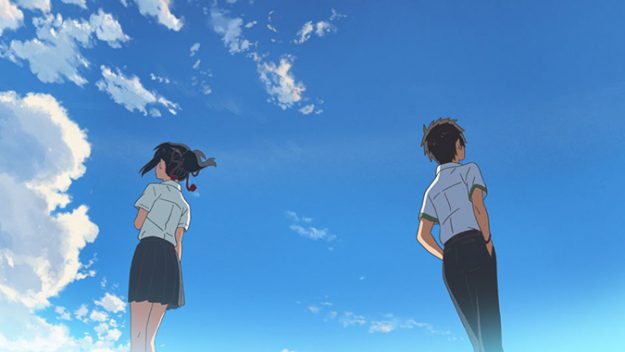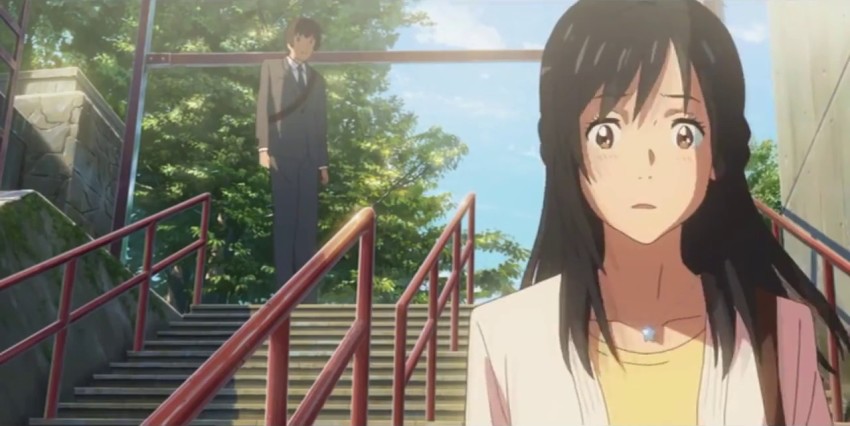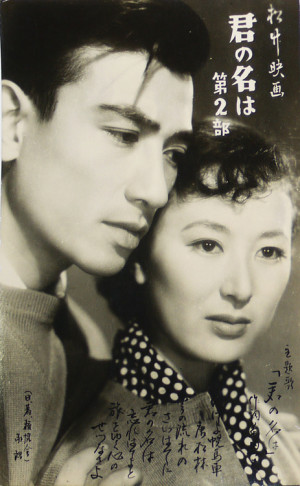The End of Your Name
November 1, 2017 · 2 comments
By Andrew Osmond.
 SPOILERS! This article discusses the end of Makoto Shinkai’s Your Name. If you’ve not seen it yet, do not read on unless you’re really okay with knowing how a film ends in advance. And we honestly think that with Your Name, that would take away a lot of the viewing experience. So once more, SPOILERS!
SPOILERS! This article discusses the end of Makoto Shinkai’s Your Name. If you’ve not seen it yet, do not read on unless you’re really okay with knowing how a film ends in advance. And we honestly think that with Your Name, that would take away a lot of the viewing experience. So once more, SPOILERS!
Still with us? Good.
How much of Your Name’s huge box-office came from its end, from its last moments? As we explain below, it’s so easy to think of it ending differently. If it hadn’t ended on such a crowd-pleasing, feel-good note, would it still have been a blockbuster? Or would it have been a far more modestly performing film – a success, but no phenomenon? The film itself tells a story about changing history. Did Your Name’s own history (and Shinkai’s) turn on its closing seconds?
It’s impossible to know, of course. Certainly, many of Your Name’s fans flocked to find the outdoor steps where the film ends, based on the Suga Shrine steps in Yotsuya, Tokyo. According to a BBC story from soon after Your Name opened, crowds of people were taking photos… and we’d lay money they were shouting “What’s your name?” to their girlfriends and boyfriends, and annoying passers-by.
But that’s fans for you – they love finding “real” places in anime, whether they were significant or incidental in the story. Reportedly a Gifu library in one brief scene became a fan mecca. Personally, I’m more interested in finding that nice-looking ryokan where the characters spend the night. (I saw Your Name in Shinjuku’s “Wald 9” cinema, part of a building that’s visible in the film – now that’s weird.)
But back to the ending. It’s irresistible to wonder about it, as there’s an obvious alternative ending in the film. I mean the bit on a snowy Tokyo night, visually stunning even by the film’s standards, where the adult Taki and Mitsuha pass each other on a bridge. Each character turns, looks back a moment – it’s obvious they sense something – and then keep walking in opposite directions. There’s a portentous drum beat (bit like the Eastenders “doof-doof” sting). The End… only it’s not.
 Jonathan Clements, author of Anime: A History, points out this scene – what gamers would call a Bad Ending, even while aesthetes would call it good – seems to be a literary allusion. It echoes a short story by Haruki Murakami, called “On Seeing the 100% Perfect Girl One Beautiful April Morning.” Published in the story collection The Elephant Vanishes, the piece is both playful and melancholy, as serious (or not) as you think it should be.
Jonathan Clements, author of Anime: A History, points out this scene – what gamers would call a Bad Ending, even while aesthetes would call it good – seems to be a literary allusion. It echoes a short story by Haruki Murakami, called “On Seeing the 100% Perfect Girl One Beautiful April Morning.” Published in the story collection The Elephant Vanishes, the piece is both playful and melancholy, as serious (or not) as you think it should be.
The Murakami story describes a girl’s and boy’s miracle meeting. Through cosmic grace, they’ve each been “found by their 100% perfect other,” but they’re too young to realise it, to trust the miracle. Separated, they experience terrible trials. They even lose their memories of each other. “When they awoke,” writes Murakami, “their heads were as empty as the young D. H. Lawrence’s piggy bank.”
Years later, the boy and girl pass each other in a Tokyo street, knowing deep down that the other person is their soulmate. But it’s too late; they’re too old; their hearts no longer rule their heads. They pass; they miss each other, forever.
The Murakami moment is echoed twice in Your Name. The first time is the snowy bridge scene; the second is right at the end where the characters pass each other on the steps, knowing the other person is the love of their life but too scared to speak out. In principle, Shinkai could have ended right there, before Taki screws up his courage and turns round, but some cinema audiences might have rioted.
From one angle the Murakami tale which Shinkai echoes then reverses is the distillation of an old love story popular in Japanese film – the “ships that pass in the night” story, or sure-chigai in Japanese. There’s an excellent article on the genre by film critic Mark Schilling. Of course sure-chigai exists outside Japan too. The great Western encapsulation is Casablanca, where lovers meet and are forced apart, then meet and are parted again, their sole consolation being “We’ll always have Paris.”
 But in Japan, one of the most iconic sure-chigai titles is Your Name. No, we’re not talking about Shinkai’s blockbuster. Rather, we mean a story from nearly seventy years earlier. This 1950s saga has exactly the same Japanese title as Shinkai’s film – Kimi no Na wa – but no comets or body-swapping.
But in Japan, one of the most iconic sure-chigai titles is Your Name. No, we’re not talking about Shinkai’s blockbuster. Rather, we mean a story from nearly seventy years earlier. This 1950s saga has exactly the same Japanese title as Shinkai’s film – Kimi no Na wa – but no comets or body-swapping.
Rather, the older story is about a young couple who first meet on a bridge during the catastrophic Great Tokyo Air Raid of 1945 – a worse trauma than even the Tohoku earthquake that inspired Shinkai’s film. In the story, the man and woman fall in love during the terrible raid. They promise to return to the bridge in six months’ time, without even getting each other’s names. Of course, things go wrong, the meeting is missed, and searching and heartbreak follow.
The drama originated as a sensationally popular radio serial, and was then turned into a film trilogy in 1953-4. Schilling notes the locations on screen “became tourist meccas,” like those in Shinkai’s film. And if the 1950s Kimi no Na wa sounds far removed from the anime blockbuster, then another film effectively connects them. Satoshi Kon’s anime Millennium Actress (2001) is a magic realist fantasy, as heightened in its telling as Murakami and Shinkai put together. Kon’s heroine crosses celluloid realities in frantic search of a rebel hero she met as a girl and can’t forget. In the middle of Kon’s film, the heroine, an actress, is glimpsed in a film still; it’s Kimi no Na wa in all but name.
And weirdly, in Miyazaki’s Spirited Away, girl meets boy and the two slowly recognise that they met long ago (well, long ago for a child). At the end, they part again. Much like Your Name, the girl, Chihiro, seemingly loses her memory of the encounter and is left with yearning. Contra Murakami, though, Chihiro’s soul seems strengthened despite the loss of her love, and perhaps due to the loss. Your Name makes a similar suggestion, in its scenes of the bereft adult Taki who now treasures the world around him.
Other anime play around with similar themes, especially with magic manipulations of memory. Consider the sad or joyous, or sad and joyous, endings to Angel Beats, Steins; Gate and Madoka Magica. It’s even echoed in the epilogue to a franchise film, Bleach: Memories of Nobody; there are analogues in Western fantasy too. You could argue Your Name’s last scenes amount to a typical, even clichéd resolution for anyone who sees lots of anime. But Your Name’s themes resonated in the Japanese mainstream before anime, much as so-called “tsundere” heroines existed decades and centuries before the Japanese computer games that coined the label.
But does the happy end of Your Name play to the mainstream, or pander to it? Would the film have been better if it had ended like Murakami’s story, with the characters missing their last chance – and would it have made tens of millions of dollars less as a result? It does seem plausible that viewers might have been less inclined to rewatch the film, or recommend it to friends, if it had ended on a downer.
True, there might have been ways to sugar the pill – maybe it needn’t have ended so baldly, with the characters just walking into the night alone. Casablanca, Dr Zhivago and even Titanic all came up with last-scene consolations after heartbreak. However, it would take some nifty writing to not make things worse. Having Taki hook up with his beautiful restaurant senpai wouldn’t do; maybe a time-changing twist with Mitsuha’s dead mum?
Some reviewers, understandably, have looked to Shinkai’s back catalogue. Whereas Your Name ends entirely happily, his previous films tend to have mixed endings, with different combos of bitter and sweet, though most are happy-ish. One of Shinkai’s past endings, interestingly, is basically happy except for a character mourning the loss of what she felt when she was sad. Another Shinkai film ends like Your Name, except that it goes in the Murakami direction – at the end, the meeting’s missed. This film provokes some very strong reactions. I once left a screening to the sound of an audience member loudly denouncing the end as horrible.
I liked the “horrible” ending myself, but I think Shinkai has the right to end Your Name differently, with a benign wink and a grin. Indeed, the film’s post-comet coda can be seen as a private joke between him and his fans, particularly those who hated his sad endings and spend Your Name’s last minutes terrified he’s going to do another. It feels especially trollish of Shinkai to black out the screen, as if to run credits, just after a glimpse of Mitsuha’s teenage sister to remind us hundreds of lives have been saved. Of course that won’t satisfy anyone invested in the love story. “Blast you Shinkai, let them meet!”
In a Q&A at the British premiere, Shinkai said he gave Your Name a happy end because of the trauma of the Tohoku Earthquake which underlies the plot. Given that was a disaster where nearly twenty thousand people died, it could be seen as a supremely tasteless piece of wish-fulfilment… or else doing what fantasy cinema has done for generations, overlaying real horror with dreams. Now Your Name is being screened round the world, by audiences who won’t connect the story with a specific event. For them, it may come down to a simple question. Do they prefer happy endings or sad ones?
Andrew Osmond is the author of 100 Animated Feature Films, and he really likes the end of Your Name.
Kenshin Himura
January 29, 2020 2:44 am
please I want to know the full ending of your name iwant to know what happens between taki and mitsuha because i love the love story of them it makes happy but i want to see the ending if it is happy ending for taki and mitsuha and all the memories of them will be back
Mitsuha Miyamizu
November 16, 2020 11:35 am
Shinkai (The Director) has confirmed that they are getting married by 2024. But actually its obvious that they remember each other and the story they went trough. If they'll there Name, all the experiences will come Back! Here you can watch a Fan Made thing :https://www.youtube.com/watch?v=y-9peg35-GM&t=480s&ab_channel=%E3%83%9E%E3%83%BC%E3%83%86%E3%82%A3%E3%83%B3M%C4%80TIN